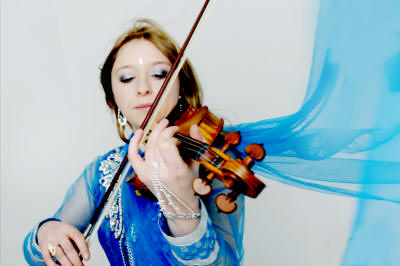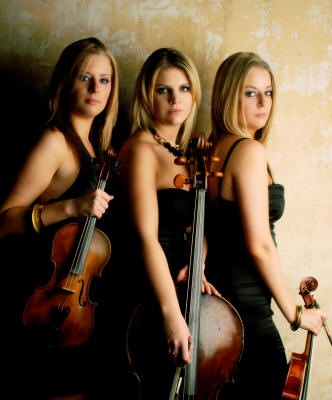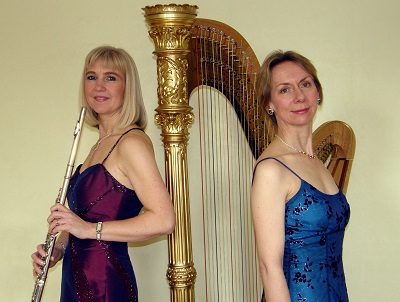Classical Solos Duos And Trios - for your Event
Live Music Booking Service for Your Party, Wedding or Event from - Midsummer Music - the music people
To see available Classical Solos Duos And Trios
select your County or Location
About Classical Solos Duos And Trios
The Classical Solos Duos And Trio pages list ensembles that are available to perform in your area. They are probably the most versatile music group for Weddings and Banquets. To find out more about them, read on:This section of pages combines classical solo instrumental musicians (e.g. solo violinists), with duos and trios comprising many instrumental combinations, including vocalists. (Solo vocalists have their own section.)
 As one moves from the standard classical ensemble of a string quartet to
smaller line-ups of trio, duo and solo, then the repertoire becomes less general
and more specific. Whereas a string quartet will typically have a vast
repertoire of many baroque, classical, romantic, light jazz, music from the
shows and films, and some also including pop covers songs, a trio will normally
have a slightly restricted number of pieces to play that are suitable for
weddings and general background music. Having said that, most trio repertoires
are still extremely large. One reason for this is that the music publishers of
arrangements of music that was not originally written for string quartet or trio
(the majority of the popular wedding songs), write mostly for string quartet as
it is a bigger market and also easier to write good arrangements for than a
trio.
As one moves from the standard classical ensemble of a string quartet to
smaller line-ups of trio, duo and solo, then the repertoire becomes less general
and more specific. Whereas a string quartet will typically have a vast
repertoire of many baroque, classical, romantic, light jazz, music from the
shows and films, and some also including pop covers songs, a trio will normally
have a slightly restricted number of pieces to play that are suitable for
weddings and general background music. Having said that, most trio repertoires
are still extremely large. One reason for this is that the music publishers of
arrangements of music that was not originally written for string quartet or trio
(the majority of the popular wedding songs), write mostly for string quartet as
it is a bigger market and also easier to write good arrangements for than a
trio.
Although we have a separate section on our website for Classical Duos, we include them here along with soloists and trios to give you a broad view of the available options if you want to go for a live music group that is smaller (and sometimes cheaper) than the more common string quartet. As Classical Duos are covered elsewhere, no more will be written here about them, other than to say that although they will play the most popular of the wedding repertoire, many duos will have an extensive and delightful repertoire that is specific to their line-up of instruments. There is a vast amount of baroque and early music written for string and woodwind duo combinations. Spanish guitar duos often have a very different repertoire of music, often from composers who do not write for the string and woodwind ensembles. (Note: string instruments here apply to violins, violas, cellos, double base i.e. instruments that are usually played with a bow. Instruments such as guitar, harp and even [real] pianos do of course have strings, but ones that are plucked or struck, not bowed. So they each have their own category.) Althought there are ensembles including harp with other instruments, if you are looking for a solo harpist, look at the Harp section of our website.

The main comparison between this category of live music, is with the ubiquitous String Quartet. The String Quartet is the 'benchmark' against which all other offerings are judged, even the symphony orchestra. It has been claimed to be the purest and most perfect ensemble. I agree (but don't take any notice of that, because I am heavily biased playing in a quartet myself.) The reality is that any kind of live music is very special and everything from the solo performer to the 130 piece Wagnerian orchestra is wonderful and has its place and purpose. So ignore me and judge for yourself. It is what you like that is all that matters, not what people tell you that you should like!
If you are a wedding planner or just struggling through your own wedding planning, you will be thinking about booking entertainment of some form, and possibly your budget means it has to be low cost and you are happy to accept some restrictions of repertoire. (Or perhaps you prefer the repertoire that was specifically written for these smaller ensembles. Some of it is absolutely delightful and magical.)
So if you are wanting live music, or music to walk down the aisle to, consider a soloist, a duo or a trio. It might not sound as rousing as string quartet but can have a purer, more intimate feel, either for a small wedding reception, a wedding ceremony in a small intimate venue or church, just general wedding entertainment or general wedding background music.
If you are in the business of event entertainment, smaller music groups have positive advantages in certain situations e.g. a small corporate dinner or banquet, a product launch in a small venue or exhibition stand, where cost has to be kept to a minimum. (having said that, a trio is often as expensive as a string quartet. This is because the musicians who are happy and able to perform in these smaller ensembles tend to be extremely good, so may charge a premium - though not always. It pays to check the price guide on our county and town pages. It is the musicians who set the prices, not us, so prices can vary a great deal.
 Now let us consider the issue of setting up for these smaller ensembles. You
have been referred to string quartets, above, where we talk about the issues
connected with siting a live music group to get the best out of their musical
performance. The issues are the same for solos (soloists) duos and trios, but
magnified in importance.
Now let us consider the issue of setting up for these smaller ensembles. You
have been referred to string quartets, above, where we talk about the issues
connected with siting a live music group to get the best out of their musical
performance. The issues are the same for solos (soloists) duos and trios, but
magnified in importance.
As the line-up of instruments gets smaller, then the sound volume they produce generally gets less, though not always. A harp is a reasonably loud instrument in its own right, and a piano produces a lot of sound, whether an original stringed version or an electric piano or piano keyboard. Bear in mind though that if a piano is playing with a stringed instrument or woodwind, it has to moderate its volume to that of the other instrument(s) to ensure proper ensemble.
So, what does this mean in real terms? It means that the number of guests and ambient background noise level is more important, as is the acoustics of the venue and the sighting of the musicians relative to the guests and audience. Other than that, all other things are much the same as for string quartets.